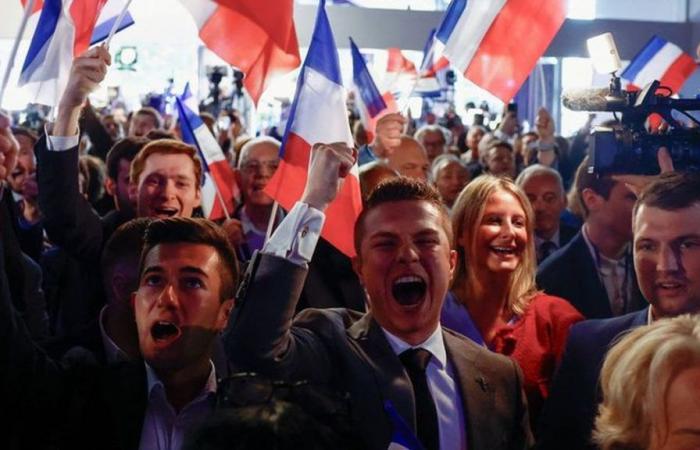A Santa Fe look at Europe’s “turn to the right”: “Immigration and economy were the fuel”
Last week the elections were held for the European Parliamentwhere right-wing parties obtained good results and they will have their bank in the most conservative composition until the time of the international congress.
In cases like that of France, President Emmanuel Macron brought forward the elections in his country after the poor results, to seek to reaffirm his management in the face of the triumph of the National Rally led by Marine Le Pen.
ONE Santa Fe talked with Juan Pablo Jullierdirector of Observatory of International Politics of the Catholic University of Santa Fe (UCSF)to have a specialized look at what happened in Europe.
Elections in Europe
—What are the elections to the European Parliament that were held last week?
—The European Union as an integration block is the most important on the planet, which includes very important countries. In terms of integration policy, it is the most complete cycle we have, to the point of having a common currency. Along with this process, they have developed institutions within which they have a parliament that decides the common regulations for the member countries, and these parliamentarians were the ones elected last week.
—In light of the results obtained, could it be said that Europe had a turn to the right?
-It will be the most “right” conformation of parliament, speaking badly and quickly. He had an advance on the right, but it is not as forceful as was reported in some media. It is true that they have gained more seats and the center-left has lost some, which is why the more central forces are moving towards the right. It is important to note that, within this movement to the right, not all positions are extreme. There is a lot of traditional right, conservative right. You don’t have to put them in the same bag.For example, a libertarian right like that of Vox in Spain, along with a perhaps more conservative right, like the classic right that exists in Europe.
Right
—So, what are the right-wing parties like in the most important countries? Which ones are the most extreme?
—The country that opened the field with a slightly more extreme right it is Francewhich has also had a significant political impact in the country because has forced President Macron to call early elections for the French Parliament. In the case of Spainhad Vox a time in force, but today the Spaniards are returning more to the traditional right, which is the Popular Party. In Italy yes there is a ruler of the extreme right who is Georgia Melonibut what often happens to extremists who come to power has happened to him: They have to moderate themselves or somehow resort to pragmatism. One thing is the speech that one can have in opposition or before legislative votes, and another thing is the government, where one has to negotiate and seek agreements, a rigid position does not get you very far. And the other country that has a far-right government is Hungary with the prime minister Victor Orbán. There is a division there too, because the president of Hungary, Katalin Novák, represents another force so there is also an interesting counterweight. However, this prime minister has been questioned quite a bit by the European Union itself because He has made decisions that sometimes border on the illegal.
—What happens in Germany, where the right also positioned itself as the first majority?
—Yes, it gained a little more strength again, but the German political system –precisely a product of the experience of Nazism– It has a lot of regulations that prevent certain parties from having excessive representation at the domestic level, which is why they can hardly have excess representation at the international level. For example, German law limits the number of seats that neo-Nazi parties or any party that has any type of hate platform can have in the German Congress. The most traditional right resurfaces because We must not forget that Germany was under the government of Angela Merkel for many years, a policy like those that no longer exist. Truly, the quality of the German government under Merkel was something that unfortunately we will not have again for a while, surely, and that obviously in contrast, the new chancellor finds it very difficult to fill shoes like that. Then comes this comparison that the Germans themselves make of the current chancellor, Olaf Scholz, who is from the same space as Angela Merkel’s but who does not, unfortunately, reach that same level. So, it is common for there to be disappointment and a turn towards other political forces.
—Could the problem of illegal immigration be a common factor in these different rights?
—The lack of responses to immigration and some economic crises have been precisely the fuel and growth of these rights. However, until the European Parliament adopts an extreme measure regarding this, it would be difficult. It is most likely that the debate will be addressed at some point, but I see it as difficult for drastic measures to be taken in the style of expelling people or those types of options. Parliament deals with everything that is macro regulation that has been delegated to the member countries of the European Union. For example, environmental issues, economic issues, regulations in general, but then there are some things that remain state in Europe.
In America
—Do these international bloc elections end up influencing national elections?
-Not necessarily. Sometimes domestic politics does not go the same way as international politics. In Spain, for example, the Popular Party did very well in the elections for the European Parliament and yet in the last national elections it has not done well at all and not much time has passed since. Finland has the opposite case, it is currently a right-wing government at the domestic level, but the majority of the deputies who have entered that country are from social democracy, that is, from the center left. Then there is the French case, where what usually happens – especially in countries with parliamentary systems where support for parliament is essential for governments –, In these situations where leadership is in doubt, elections are usually brought forward to decompress. Maybe Macron’s forces, at the domestic level, are doing well, and he will get rid of this problem. Or, if it is confirmed that Marine Le Pen’s party has greater support, Parliament and the prime minister would belong to a party other than that of President Emmanuel Macron.
—In America are we living our own far-right experience? With cases like Javier Milei, Jair Bolsonaro and Donald Trump.
—In Latin America and the United States, the extent to which the right-wing cycle continues has been questioned; there are countries that come and go. For example in Mexico with the triumph of Claudia Sheinbaum The strength of the National Regeneration Movement (MoReNa) was confirmed. Argentina At the moment he has Milei, but nothing indicates that it is something consolidated, we have to wait for the results of this government and see what happens. We come from two consecutive party transitions, the same thing happens in Chili but vice versa. In Brazil, Bolsonaro He had a single mandate and then he left, the same trump in USA. I would say that the only one that is more stable for now is Bukele in The Savior, but also the product of some strange constitutional reforms where he achieved a re-election that was not originally provided for in the constitution of El Salvador. So It is difficult to say if there is a trendit is highly anticipated to speak out on the matter today.
READ MORE: Macron called for early legislative elections after the defeat in the European elections in France






